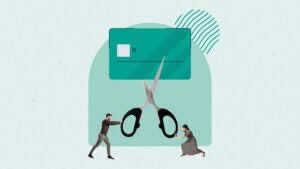Alternatives to debt relief




Key takeaways
- Debt relief companies can carry serious risks, like long-term credit damage, especially if your creditors don’t agree to work with them.
- Alternatives to debt relief include working with a credit counselor, negotiating with your creditors, consolidating your debt and tapping into the equity you’ve built up in your home.
- Seeking help from a financial advisor or credit counselor can also provide valuable support and guidance in managing debt.
Working with a debt relief company might seem like a quick fix when you’re overwhelmed by debt — but it’s not without its pros and cons. Some companies may advise you to stop making payments, which could lead to credit score damage and late fees. Even worse, there’s no guarantee your creditors will agree to work with the company.
If you’re looking for more control and fewer risks, there are safer and often more effective alternatives. From negotiating directly with creditors to tapping into your home equity to get a more affordable rate, there are several strategies to consider.
Reasons to try debt relief alternatives
Debt relief companies often promise quick results, but they can be risky and expensive. In many cases, alternatives offer more control, fewer fees and less damage to your credit. You may want to choose an alternative to:
- Protect your credit score. Some debt relief companies ask you to stop making payments, which can severely damage your credit.
- Avoid high fees. Relief programs often charge fees that add to your financial burden.
- Keep control of communication. Working directly with creditors or advisors keeps you in the driver’s seat and can lead to more flexible, tailored solutions.
- Build long-term financial health. Budgeting, consolidating or seeking professional guidance builds habits that prevent future debt.
By taking the DIY route — or working with a counselor — you’re more likely to resolve your debt without sacrificing your financial future.
5 alternatives to debt relief
While debt relief companies promise quick solutions, there are many debt relief options that put the power back in your hands. They may require more effort upfront, but they often result in less damage to your credit — and give you more control over your finances in the long term.
1. Adjust your budget
Budgeting is the first step toward regaining financial control. You don’t have to cut out all spending, but tracking where your money goes can help you prioritize debt repayment.
Just make sure you always have a bit of cash stashed away for emergencies. Having an emergency fund will reduce the chance that you’ll need to take out debt to cover unexpected costs.
50/30/20 rule example
2. Negotiate a payment plan with your creditors
Communication is key when getting your finances back under control. While it may feel intimidating to connect with your creditors, being proactive could help you lower your debt levels and prevent severe credit damage. The moment you get the notice that your debt has been sent to collections, it’s best to contact your creditors, explain the situation and start negotiations.
In some cases, creditors may be willing to help you manage your debt. If a creditor offers assistance, make sure it’s not for a fee — if it tries to charge you more for the plan or refers you to a company that does, it’s likely in conjunction with a debt relief company.
3. Consider debt consolidation
Debt consolidation combines multiple debts into one new loan or credit line, ideally with a lower interest rate. You can consolidate using:
- A debt consolidation loan.
- A balance transfer credit card.
- A line of credit.
If you secure a lower rate on your consolidation loan than the average of your current debts, you may save thousands of dollars in interest. This solution is especially ideal for those dealing with high-interest credit card debt. It can also help boost your credit score by lowering your credit utilization ratio.
Money tip: Prequalify with multiple lenders to compare offers. Don’t just focus on APR — also check for fees, perks and customer reviews.
Know that this method is only worth it if you can identify what caused the accumulation of debt in the first place and take action to prevent it from happening again in the near future. Look at your monthly, weekly and daily spending and compare it to your monthly income. Carefully monitor your credit card usage and online shopping patterns as well.
4. Look into home equity products
If you own your home, consider using your home equity to pay off higher-interest debt. These products typically offer lower interest rates than personal loans or credit cards:
- Home equity loan. A lump-sum loan with fixed payments for up to 30 years.
- HELOC (Home equity line of credit). A revolving line of credit you can draw from as needed, typically with a 10- to 15-year draw period and up to 20 years to repay.
Both products are secured by your home and typically cost less than other financing products because the lender incurs less risk. This can make them less expensive than the bad credit loan rates you might receive if you have less-than-stellar credit. However, if you default on the loan, the lender could seize your home or property to satisfy the delinquent debt.
5. Talk to a financial advisor or credit counselor
If you’re feeling stuck, a financial advisor or credit counselor can help you evaluate your options. Many banks and credit unions offer referrals to trusted professionals.
For a more budget-friendly option, look into credit counseling agencies. These organizations offer free or low-cost help and may assist in setting up a debt management plan (DMP) to streamline repayment.
Avoid for-profit counseling firms that charge steep fees or pressure you into debt relief programs.
When to consider debt settlement
There are some specific scenarios where debt settlement is likely the best choice for you and your finances. You may want to explore debt relief if any of the following scenarios apply to your current situation:
- Considering bankruptcy. If you are on the edge of having to file bankruptcy, it may be time to turn to professional advice.
- Struggling to handle debt. If your debt keeps growing after exhausting all of your options, debt relief companies may be able to settle your debt for less than what you originally owed.
- Can’t afford monthly bills. If you are struggling to afford the necessary expenses and are falling behind on your bills, reach out to a company sooner rather than later to avoid default.
Bottom line
Debt relief companies can offer short-term solutions, but often at a long-term cost. If you’re struggling with debt, alternatives like budgeting, negotiating, consolidating or seeking expert help can get you back on track — often with fewer downsides. Choose the strategy that best aligns with your financial goals and protects your credit health.
Frequently asked questions
Why we ask for feedback Your feedback helps us improve our content and services. It takes less than a minute to complete.
Your responses are anonymous and will only be used for improving our website.




